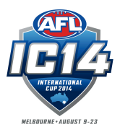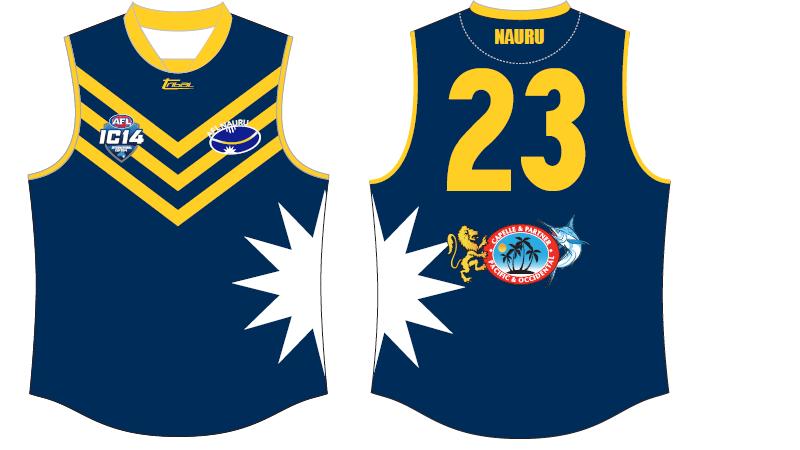IC14 Preview: Nauru Chiefs look towards top tier
- Saturday, July 19 2014 @ 10:00 pm ACST
- Contributed by: Troy Thompson
- Views: 5,555

 Nauru is a tiny Pacific Island nation that has the distinction of being the only country in the world that has Australian Rules as its national sport (assuming that status is disputed/shared by several sports in Australia). The capital city is Yaren and the population is just 12,000 but the number of Australian football participants is around 300.
Nauru is a tiny Pacific Island nation that has the distinction of being the only country in the world that has Australian Rules as its national sport (assuming that status is disputed/shared by several sports in Australia). The capital city is Yaren and the population is just 12,000 but the number of Australian football participants is around 300.
The the national team is known as the Nauru Chiefs and they are a team just below the top tier at the International Cup and capable of stepping up with an upset.
Road to the International Cup
After finishing IC08 in fourth place Nauru were probably a little disappointed to finish sixth at IC11. Coming up against PNG in their second Division 1 match was probably an unfortunate draw, which saw them play South Africa in the 5th/6th place playoff. On form most would have expected them to win that match but they were narrowly beaten by the South Africans. The Nauru domestic competition is made up of six teams that are based on AFL club names and colors. They are the Bulldogs, Magpies, Cats, Bombers, Kangaroos and Hawks. The Bulldogs have won the last three Grand Finals (and were Premiers and Champions in 2012 and 2013).
In 2011 most of the Nauru team spent time in Australia playing with country footy clubs to acclimatise in the lead up to IC11. This time around they have taken a very different approach. "Instead of sending some players to country Victoria to acclimatise we have decided to keep the whole squad together in Nauru. Our senior competition started early this year and concluded in May so we can select a squad and have them training together for 3 months leading up to the cup. The team bonding has been fantastic and because they have been training together and not scattered like before, the team is gelling very well and has enabled the coaching staff to work on their structures and playing styles much better" Batsiua said.
This time around the team will be coached by Paner Baguga - a local coach who is also the National coach of the junior Nauru team that wond the Oceania Cup last December in Fiji.
Of course the biggest hurdle every team intending to compete at the International Cup is the large cost of bringing the squad and support staff to Australia. The AFL Nauru President told us the "community support has been fantastic - the major fundraiser was supported well by the corporate sector providing all the prizes and we raised over $38,000 in one raffle draw. Other fundraisers like food stalls, bingo games etc. have raised a lot of money as well. Although there is no official majore team sponsor, team jumpers and shorts have been (supplied by and) sponsored by Capelle and Partners and the team tracksuits have been sponsored by Baitsi Laundry. Other sponsors have been important including Our Airline (providing fare discounts), Transfield Services and Digicel Nauru (raffle sponsors).
The Country and Australian Football
Nauru is an island nation in Micronesia in the South Pacific. Its nearest neighbour is Banaba Island in Kiribati, 300 kilometres (186 mi) to the east. Nauru is the world's smallest island nation, covering just 21 square kilometres (8.1 sq mi). With just over 9,265 residents, it is the second least-populated country after Vatican City. Settled by Micronesian and Polynesian people, Nauru was annexed and claimed as a colony by the German Empire in the late 19th century. After World War I, Nauru became a League of Nations mandate administered by Australia, New Zealand, and the United Kingdom. Nauru gained its independence in 1968.
Nauru is a phosphate rock island, with deposits close to the surface, which allow for simple strip mining operations. This island was a major exporter of phosphate starting in 1907 until the deposits ran out during the 1980s. The island also benefited financially when it was an off-shore detention centre for illegal immigrants into Australia for a period recently.
Football was first played by Nauruan schoolchildren in the 1930’s in schools in Victoria, Australia. Among these schoolkids was Hammer DeRoburt. Schools in Geelong and Melbourne in Victoria were popular destinations of Nauruan schoolchildren of secondary-school age. After DeRoburt left Australia, he headed back to Nauru with a couple of friends and popularised the sport in his hometown. Whilst the phosphate mining continued Aussie ex-pats helped to keep the competition alive and prospering.
Internationally Nauru first participated in the 1995 Arafura Games in Darwin, Australia. The team, coached by former VFL/AFL player Mark Yeates finished third, winning the Bronze medal. In 2000, the Chiefs travelled to Queensland to compete in the inaugural Web Sports Cup to compete against teams from Samoa and the Robina Roos from Australia. The Chiefs won both matches. In 2001, the Chiefs again travelled to Queensland winning another two matches, one against the Gold Coast Old Boys. In the same year the Chiefs won the gold medal at the 2001 Arafura Games, defeating the Japanese national side.
At the AFL International Cup in 2002, the Chiefs finished in 8th place, ranking Nauru the 9th strongest Aussie Rules nation in the world. Nauru withdrew from the 2005 International Cup. They attended the 2008 event however due to intense rivalry and violence in the National League, the NAFA (Nauru Australian Football Association) placed strict conditions on player eligibility to encourage a sense of unity, meaning that only players under 23 years old with a clean record were able to represent Nauru in the Cup. A number of members of the national team were placed with clubs in country Victoria to spend a few months developing their skills before the tournament. The team performed exceptionally, being beaten once in the opening pool round by the eventual winners Papua New Guinea, their only loss, to place 5th overall. As detailed above their 2011 tournament saw them perform well but ultimately finish 6th after losing to PNG and South Africa.
In recent years Nauruan youngsters coming through have benefited from the annual development opportunities offered by the AFL in the form of the Oceania Cup and the chance for players to compete at the NAB Under 16 Championships in Australia. "Ït gives our local junior competition targets and incentives and motivates young players to aim for national selection so they can be spotted in the regional competions and win a spot on the Oceania and South Pacific teams. There is a clearer pathway which helps all adminstrators and coaches of local leagues in motivating our young players" Batsiua told us. The benefits of this pathway will no doubt be seen in the younger players now coming into the Chiefs squad.
Strengths and Weaknesses
Strengths must include the football preparation on home soil and team unity that has been built. At IC11 when the team was under the pump against South Africa and PNG it was perhaps here they lacked something and the ability to regroup effectively to challenge again.
In 2008 Assistant Coach Wes Illig described the Nauruan players “all players stand out because of their low centre of gravity and the general carnage left behind them after they have hit the football. We will not have any 6 footers but as the ball is played on the ground 99% of the time height is not all it is cracked up to be and if you have 20 blokes having a go, leaving a physical trail of destruction behind them, teams tend to lose concentration of their game plans and structure”. We expect to see more of this used to effect at IC14.
The Squad
|
|
SURNAME |
NAME |
CLUB |
|
1 |
ADAM |
OTTO |
CATS |
|
2 |
ADIRE |
SNUKA |
BULLDOGS |
|
3 |
AGEGE |
LENNOX |
BULLDOGS |
|
4 |
AMWANO |
JONAS |
BULLDOGS |
|
5 |
BATSIUA |
MALLINSON |
MAGPIES |
|
6 |
BATSIUA |
MAVERICK |
HAWKS |
|
7 |
BAUI |
KAZAAM |
MAGPIES |
|
8 |
COOK |
RONPADE |
MAGPIES |
|
9 |
DAGIARO |
CHARLES |
KANGAROOS |
|
10 |
DAGIARO |
JOHNNY |
BOMBERS |
|
11 |
DAGIARO |
PILO |
CATS |
|
12 |
DANIEL |
AYKERS |
BULLDOGS |
|
13 |
DEPAUNE |
TRENT |
CATS |
|
14 |
DETENAMO |
MARCUS PAUL |
BOMBERS |
|
15 |
FIOLAPE |
HESS TEKAI |
CATS |
|
16 |
GRUNDLER |
DJ |
BOMBERS |
|
17 |
GRUNDLER |
GERMAN |
BOMBERS |
|
18 |
HARRIS |
YOSHI |
MAGPIES |
|
19 |
HIRAM |
MIKEY |
KANGAROOS |
|
20 |
IKA |
KINGSTON |
BOMBERS |
|
21 |
KAMTAURA |
TIPUNG |
CATS |
|
22 |
MOSES |
DONATELLO |
BULLDOGS |
|
23 |
MWAREDAGA |
DAVE |
KANGAROOS |
|
24 |
OPPENHEIMER |
KENNETH |
MAGPIES |
|
25 |
TEABUGE |
TIMOTHY |
HAWKS |
|
26 |
TEMAKI |
ZAC |
CATS |
|
27 |
UEPA |
JOSE |
BULLDOGS |
|
28 |
UERA |
GREIGOR |
CATS |
|
29 |
WAIDABU |
TIANA |
CATS |
Players to Watch
The Dagiaro boys are exciting players. Veteran Johnny Dagiaro played at the IC08 and IC11 tournaments brings his experience while rookies Charles and Ezekiel "Pilo" Dagiaro should provide a lot of highlights for Nauru with their speed, strength and agility.
Form Guide and Bottom Line
Eighth in 2002, fifth in 2008, sixth in 2011. This time the Chiefs are a chance to make it a top 4 finish if they can pull it all together. There is high anticipation and excitement across Nauru for the team to go far in the tournament this time.
A final note
We asked Mathew Batsiua if there were any moves towards women's footy being played in Nauruω He told us "Not at this stage, if we get more volunteers then we can consider it.



 RSS news
RSS news Twitter
Twitter Facebook
Facebook